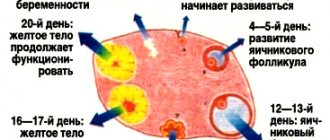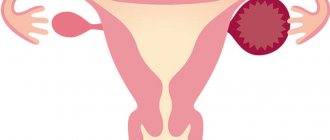Can you ovulate before your period?
menstrual irregularities at least once . They are directly related to the moment the egg is released. Sometimes it happens that ovulation occurs later than usual. You should be aware of the nuances of this phenomenon, since it always has a basis.
Hide content
The process of ovulation depends on the speed of follicle maturation . This occurs under the influence of certain hormones. Their growth is influenced by estrogens. These include estradiol, estriol and estrone.
The initial stage of the menstrual cycle is characterized by the growth of follicles, in each of them an egg matures. Then the dominant one is determined, which continues to grow, and all the rest are subject to atresia.
Ovulation is the rupture of the follicle and the release of the egg. If sexual intercourse is carried out on fertile days , the female reproductive cell may encounter sperm on its way.
In this case, conception occurs.
In an average 28-day cycle, the egg matures in approximately 2 weeks; some women ovulate earlier, others later. The duration of this process can be influenced by various external and internal factors . These include:
- Development of genital diseases.
- Depressive state.
- Deviations from the norm of hormones.
- Taking medications.
- Heavy physical activity.
REFERENCE! The process of determining ovulation will be most accurate if carried out under the supervision of a physician.
The moment the egg is released depends on the level of hormones and the duration of the follicular phase. In some girls, follicle growth occurs slowly. In this regard, the first stage of the cycle becomes longer. The reason for this phenomenon may be a lack of the hormone estradiol .
Ovulation itself can occur before the date of the expected menstruation under the influence of certain circumstances, but in this case the cycle itself will shift.
Menstruation cannot begin immediately after the rupture of the follicle, since the luteal phase begins, which almost always has a duration of 14 days +/- 2 days.
sexual intercourse occurs during this period , then there is a high probability of conception.
Based on previous cycles and the duration of pregnancy, the woman concludes that ovulation occurred before menstruation.
But in fact, the cycle simply increased its duration due to disturbances in the follicular phase .
ON A NOTE! If fertilization is successful before menstruation, the expectant mother will learn about the presence of pregnancy much later than it would be in a normal cycle.
Time of menstruation
If the egg is released late and there is no fertilization, the cycle is completely shifted. A woman begins to worry because pregnancy tests show a negative result and her period does not come. A reasonable course of action in this case would be to contact an antenatal clinic. The following manipulations will help in making a diagnosis:
As part of the survey, the patient can provide information about the sensations that she has had over the past few days. It is quite possible that mucous discharge was present and pain was observed in the lower abdomen.
Some representatives of the fair sex may experience an increase in libido during the period of egg release, and their mood and attitude towards the environment changes.
Menstruation in this situation will come no earlier than in two weeks. The results of an ultrasound examination will reveal the corpus luteum, which produces progesterone. Menstruation will begin only after its decline, when the corpus luteum completely disappears.
The nature of menstruation will not differ from the usual state. Its duration and intensity will remain the same. To avoid this phenomenon, a woman must adhere to the following rules:
- Control hormone levels.
- Lead a healthy lifestyle.
- Conduct basal temperature analysis.
- Visit your local gynecologist regularly.
IMPORTANT! Without confirmation of the fact of late ovulation, one can suspect the presence of serious abnormalities.
Probability of pregnancy
Unexpected conception very often occurs at a time when ovulation occurs later than usual. Many girls adhere to the calendar method of contraception . They focus on the cyclical process of maturation of the female reproductive cell.
But every rule has its exceptions. Pregnancy can be an event that takes a woman by surprise.
The likelihood of pregnancy is extremely high. Daily measurement of rectal temperature and the use of ovulation tests will help protect against it. It becomes easier to catch the release of an egg if you use the folliculometry method.
It is quite possible for an egg to be released before menstruation, but in this case the onset of menstruation will be delayed by 14 days. The reason for this phenomenon often lies in failures of the follicular phase . Violation of the luteal stage is extremely rare. But its presence should be excluded if such problems arise.
Source: //rebenok.online/planirovanie-beremennosti/ovulyaciya/mozhet-li-byt-pered-mesyachnymi.html
What are the chances of getting pregnant during your period?
Everyone knows that pregnancy begins only when a sperm meets a mature egg. This only happens during ovulation. A sperm can live in a woman’s vagina for up to seven days, but an egg can live for no more than two. Thus, conception does not occur quickly enough, even in completely healthy partners.
Ovulation is the second short phase of the menstrual cycle, which occurs in its middle, the 14th day, but taking into account the characteristics of each organism, plus or minus 2–3 days. It is not difficult to guess that it is simply impossible to get pregnant this way, but again, provided that the woman is completely healthy and the menstrual cycle runs smoothly, without any failures, delays or irregularities.
If a girl’s menstrual cycle is quite short, 20–23 days, then the ovaries mature on days 5–7. Ovulation itself occurs already on the 11th–12th day, and directly coincides with the first critical days of active discharge. As already mentioned, sperm lives in the vagina for up to seven days.
Thus, if any of these sperm turned out to be very tenacious and lasted longer than three to four days, then pregnancy is quite possible. This is a very pressing question, since in modern practice there are many cases where a couple, neglecting contraceptives, encounters a similar phenomenon.
Is it possible to conceive before menstruation?
Along with questions about pregnancy planning, many women wonder if they get pregnant before their period, will they go?
What does the letter of medicine tell us?
Fertile days for women
The MC consists of 2 stages, in the middle of which ovulation occurs - the release of an egg ready for fertilization from the follicles. From the moment menstruation begins, a woman’s body again begins to prepare for the development of a new egg and possible pregnancy. The ovulation period falls on days 12-16 of the cycle, provided that it is a standard 24-32 day cycle.
Menstrual cycle diagram
The highest probability of fertilization occurs on the day the egg leaves the follicle. With a cycle duration of 30 days, it will occur on days 14-16.
It is extremely difficult to say specifically when ovulation occurs. Fortunately, today there are special tests that help determine at home when “time X” comes.
Pregnancy can occur if sexual intercourse takes place 4 days before ovulation and during the next two days after it. This is due to the peculiarity of seminal fluid. In a capable state, sperm are able to maintain their vital activity for 3-4 days after leaving the male genitals.
In the case of unprotected sexual intercourse, the egg ready for fertilization will “meet” the sperm immediately after its release from the follicle. Over the next two days after ovulation, if the egg is fertilized, it moves along the fallopian tube into the uterine cavity, where it attaches to its wall, starting the pregnancy process.
According to this principle, a woman conceives. But the female body is individual, with its own characteristics. Predicting the day of ovulation and saying exactly when conception occurred is problematic. Even if the MC has been the same over the past few months, the maturation of the fertilized egg may occur at different times.
Another home method for detecting ovulation is measuring basal temperature. At the same time, taking into account the huge number of external and internal factors influencing the results of such a test, errors do occur.
Under what conditions can you get pregnant before your period?
The human body tends to behave unpredictably: even with a regular cycle, disruptions in the ovulation process can occur. For the same reason, conception is also possible. The causes of disruption of the reproductive system can be:
- transferring stress;
- viruses and infections;
- inflammatory processes;
- hormonal imbalances;
- sudden changes in temperature.
- There are several factors that influence changes in the date of ovulation.
Changes in the menstrual cycle
Is it possible to get pregnant before your period? Quite possible. In women with unstable MC, ovulation can occur at any time, including 3 days before menstruation.
And it will be almost impossible to determine whether days are safe or not, since a day that was safe in the previous cycle may be ideal for conception in the current one.
The risk of getting pregnant if your period is missed a week before is high - up to 35%.
Moreover, even women with an established regular cycle experience disruptions 2-3 times a year. And they can be provoked by the reasons mentioned above.
Second ovulation – is it real?
Sometimes in a woman's body, ovulation can occur several times in one cycle. This is a normal physiological process.
The main signs of double ovulation:
- very abundant white-yellow discharge;
- minor nagging pain or tingling in the lower abdomen;
- pain in the lumbar region.
Maturing two eggs at the same time does not eliminate the risk of pregnancy before menstruation. In addition, repeated ovulation often occurs in girls with irregular sex life. By doing this, the body independently strives to realize the process of conception as much as possible.
Hormonal imbalance as a result of taking OK
Taking hormonal contraceptives blocks the activity of egg development: the appendages stop working, which entails blocking the ovulation process. A standard package of contraceptives consists of 28 tablets, while the last 4 contain zero concentration of hormones - “pacifiers”.
Their task is to stimulate the production of one hormone by suppressing another. In this case, there is no possibility of developing pregnancy even if the egg is fertilized by a sperm.
In the case when a woman refuses contraception, it can, but the chances are extremely low, and ovulation very rarely occurs immediately after stopping COCs.
Myths and reality regarding conception before menstruation
Let's look at the most common myths about pregnancy during this period of the cycle.
- Myth No. 1 – there are only 2 days in a cycle for conception. There are indeed 2 days for conception, but they can occur at any time during the “fertile window” when the egg is released from the follicle. The duration of the fertile period is 6 days. The greatest chance of getting pregnant occurs on the day of ovulation and the day before it. But, given the prolonged activity of sperm, the period of conception can reach 10 days.
- Myth No. 2 – pregnancy can only occur on the 14th day of the cycle. As mentioned earlier, each girl has her own cycle length, and there are a huge number of factors that influence the onset of ovulation. However, even with a regular menstrual cycle, a shift in the days of ovulation is a completely natural phenomenon, not to mention hormonal imbalances.
- Myth #3 – You can’t get pregnant on the first day of your period. Indeed, if the egg died and came out along with menstruation, then what will be fertilized when sperm penetrates inside? In the first days of MC it is impossible to get pregnant, since the level of FGS in the body is just beginning to increase. But a woman may think that she got her period, but it was ovulation with spotting.
Bottom line
Pregnancy is an important and responsible period in a woman’s life. Many doctors advise planning this event: careful preparation and following the recommendations of reproductive specialists is the key to a normal pregnancy and the birth of a healthy, strong baby.
Is it possible to conceive a child before menstruation? Absolutely yes! Pregnancy can occur on any day of the cycle. This can be triggered by hormonal imbalances, an unstable cycle, and even sudden changes in ambient temperature, which leads the reproductive function to a certain stressful state.
It is impossible to say clearly when the most favorable days for conception will be. There are tests to help determine the day of ovulation. And with a regular menstrual cycle, ovulation occurs approximately ½ of the cycle.
What method do you use to determine the day of ovulation? Did you or your friends manage to calculate this day?
Source: //DaZachatie.ru/cykl/zaberemenet-pered-mesyachnymi
Is it possible to get pregnant during menstruation?
Popularly, menstruation refers to bleeding that begins on days 21–23 of the menstrual cycle and lasts 3–5 days. Theoretically, it is impossible to get pregnant during discharge. But in fact, the answer will be completely ambiguous.
Doctors do not recommend having sex during discharge. The fact is that the thickened walls of the uterus are very sensitive to the male genital organs. Passionate sex can be quite painful, downright unpleasant. But girls whose sex life is regular can engage in lovemaking even during discharge without any problems.
Of course, if this question arises, it means that sexual intercourse is definitely performed without any contraceptives. Partners want to rely even more on tactile sensations, guided by the fact that it is impossible to get pregnant during menstrual flow, and this is a very dubious argument.
Menstruation is an increasing process, where from the first day, the uterus gradually begins to open. By the middle of menstruation, it is already maximally open (just in time for 14 days), and then gradually narrows. During discharge, the uterus is not yet completely closed, and the cervix still remains open.
Does ovulation occur before menstruation?
It is regulated by follicle-stimulating hormones. Their synthesis occurs in the pituitary gland. The maturation of eggs is activated. During the follicular phase, one follicle stands out as dominant. It gradually increases in size.
Thanks to ovulation, conception becomes possible. Women who want to get pregnant need to learn to determine the moment when a mature egg is released. For those who are not planning a pregnancy, it is better to refrain from unprotected sexual intercourse these days.
What is it and what are the main symptoms?
The egg, which is already mature, leaves the follicle. Destroys the walls of the ovary. It then penetrates the fallopian tubes. This process is called ovulation. It occurs in the middle of the menstrual cycle with regular periods.
ATTENTION! The date of your fertile period may shift. Then the process of releasing a mature egg will occur on days 11-21 of the cycle.
The ovulation process itself takes a little time. This is monitored by hormonal changes throughout the day – that’s exactly how long ovulation lasts. The lifespan of an egg is from 12 to 24 hours.
You can track the beginning of your fertile period using certain signs.
Symptoms when a mature egg is released
- Active production of cervical mucus, preparing a favorable environment for the survival of sperm and their successful penetration into the uterus. The mucus has a structure similar to egg white. The discharge is transparent and stretches easily.
- Increased vaginal moisture during the day and during sexual intercourse.
- Raising basal temperature.
- Increased breast sensitivity, nipple soreness.
- Elevation of the cervix. Softening her tissues.
INTERESTING! You can verify this without the help of a doctor. After washing your hands, you need to raise one leg and insert two fingers into the vagina. It will be possible to push them deep - the cervix is raised, and ovulation has occurred.
You can do this after the end of your period, so that later you have something to compare changes in the position of the uterus with.
- Increased libido. Increased sexual desire occurs against the background of hormonal changes.
- Presence of bloody discharge. Scanty drops of blood indicate rupture of the follicle.
- Pain in the side or lower abdomen. They are caused by contractions of the fallopian tubes when a mature egg moves through them or by rupture of the follicle. The pain usually doesn't last long.
- Bloating. Hormonal changes provoke flatulence. There is a feeling that clothes or a belt are in the way, squeezing the stomach.
- Slight nausea, headaches.
If you carefully listen to your body's signals, you can easily identify signs of the onset of a fertile period.
Could it be before menstruation?
Not all women always have a regular menstrual cycle. And even if it is regular, under the influence of external factors there may be disruptions in the timing of ovulation. In women whose cycle is irregular, the release of an egg can occur at any time, including before menstruation.
If the dates are shifted, menstruation will come later or at the usual time for them, but the predisposition to conception before menstruation will remain high if the ovulatory phase reaches its peak. The fertile period can occur even on the 25th day of the menstrual cycle.
A week before your period
In healthy women, it does not necessarily fall in the middle of the cycle. The release of the egg sometimes occurs earlier or later. There is a chance that this will happen a week before the start of menstruation. This is especially true for young women or those on the verge of menopause. A shift in timing is possible due to hormonal disorders or problems in the functioning of the genital organs.
Then the calendar method of birth control turns out to be ineffective, and the likelihood of conception increases. If the release of a mature egg occurs in the last week of the menstrual cycle, during this period the woman will notice characteristic signs of the fertile period.
Is it possible to get pregnant?
Ovulation is considered the optimal period for conceiving a baby. It usually occurs on days 13-15 of the menstrual cycle. You can get pregnant before your period, even on “safe days” - 5 days before the release of the egg and 5 days after.
Pregnancy becomes possible based on several factors:
- Shift in the date of the fertile period.
- When you ovulate again at the end of the cycle.
- If there was unprotected sexual intercourse and the sperm become capable within 3-7 days.
PECULIARITY! The phenomenon of repeated ovulation does not depend on the state of health and the regularity of the cycle. Two eggs can mature in one cycle. This happens to any woman at least 1-2 times in her life.
The female body can be unpredictable, especially when it comes to conception. Nature provides ways to increase the chances of fertilization.
If there are deviations in the ovulation schedule, conception occurs. If a woman does not listen to her body, she may not notice the characteristic changes associated with the release of an egg.
Could it be on days 7,8,9,10 of the cycle?
Ovulation may occur earlier. In women with a 21-day cycle, it occurs on days 9-10. If the menstrual cycle is 35 days, and even if it is regular, the release of the egg may occur before the due date. Then the fertile period may occur 7-10 days or later.
This is influenced by various factors:
- Hormonal disorders.
- Stress, emotional tension.
- Presence of chronic diseases.
- Weak immunity.
- Diseases of the genital organs.
- Overeating or fasting.
- Metabolic disease.
- Heavy physical activity.
- Climate change, sunstroke.
IMPORTANT! The timing of the fertile period shifts after stopping the use of birth control pills, as a result of abortion or miscarriage.
In women who have given birth, the menstrual cycle is also irregular, the body needs to be restored. Therefore, the fertile period can occur at any time.
Ovulation: understanding the concept
The easiest time to conceive is during ovulation. It is then that the mature egg leaves the follicle and begins to move towards the fallopian tubes. She is ready for fertilization. The egg is “active” for about a day. If at this time there is no meeting with the sperm, then the egg is rejected, and menstruation begins.
The countdown of the new menstrual cycle begins with bleeding. Ovulation normally occurs every month. But any woman can also experience anovulatory cycles, when the egg does not mature. This is a common occurrence, the main thing is that it does not happen often. Frequent anovulatory cycles indicate reproductive problems.
But their frequency also increases with a woman’s age.
Source: //zdorovo.live/beremennost/byvaet-li-ovulyatsiya-pered-mesyachnymi.html
Methods for determining second ovulation
It is worth remembering that the above signs may not appear at all. However, there are several methods that can be used to determine the onset of re-ovulation:
- home test,
- Ultrasound.
Before the onset of the second ovulation, the production of LH hormone increases. Then a second line appears on the home test. At the same time, this method has a minus; the veracity of the result depends on the quality of the medical product itself.
As for ultrasound, it must be done at the end of the cycle. Using a computer study, a specialist quickly recognizes the second ovulation. In particular, cracks and small tears will appear on the ovary in place of the previous membrane, liquid, which subsequently forms into the corpus luteum.
Does ovulation occur before menstruation?
Very often, women wonder about the possibility of conception before menstruation.
This is possible in cases where ovulation occurs before menstruation, which happens due to the maturation of two eggs in one cycle or due to disruptions in the menstrual cycle.
Such situations arise quite often, causing girls to wonder how pregnancy could occur if they had unprotected sex a couple of days before their period.
Proper nutrition has a positive effect on the functioning of the whole body
Classic woman's menstrual cycle
Typically, the menstrual cycle lasts about 28 days for girls. This is a classic option. In fact, a cycle is a period during which successive physiological changes occur.
It lasts from the beginning of menstruation until the first day of the next menstruation.
Menstruation itself is a bloody discharge consisting of a mixture of blood, mucous uterine epithelium, mucus and endometrial particles.
All organs in the female body obey a certain rate of functioning. Typically, a cycle consists of several successive phases. Over the entire cycle, the egg matures, is released for fertilization, and then, if conception does not occur, the endometrial layer is rejected and released along with menstruation.
- The cycle begins with the follicular phase, which in turn begins with the first day of menstruation. During this period, follicles grow in the ovaries, which produce estrogen hormones necessary for the full maturation of the endometrial layer. All work of reproductive structures during the follicular phase is aimed at egg maturation and providing the most favorable conditions for fertilization.
- Then comes the ovulatory phase, during which the girl is able to conceive a baby. It lasts a day or two and is characterized by the release of a mature female cell.
- Luteal. This is the last phase of the cycle, which occurs if conception does not occur during the ovulation period. Active progesterone and estrogen production begins, which causes the appearance of symptoms of PMS syndrome. How many days does this stage take? The luteal phase lasts about 11-16 days, and during these days the girl sometimes experiences breast swelling, sudden changes in mood, and an increase in appetite. The reproductive system receives a signal that it is time to expel endometrial tissue. The luteal phase ends with the arrival of menstruation and the onset of a new cycle.
It is difficult to say exactly what cycle length is considered normal. Approximately, a calendar month is taken as the norm, although in general a duration of 21-35 days is allowed. Menstruation itself takes about 2-6 days, and no more than 100 ml of blood is released.
How does the ovulatory process occur?
If you experience strange sensations, you should consult a doctor
The ovulation process lasts only a day or two and involves the release of an egg that is fully mature and ready for fertilization. It ruptures the follicular membrane and heads towards the uterus, but first the cell enters the fallopian tube.
It is during this period, while ovulation occurs, that a woman has the highest chances of conceiving a child. If on this day or a couple of days before that the girl had an unprotected PA, then conception is quite possible.
Fertilization occurs when the egg meets sperm in the fallopian tube.
After fertilization, the cell continues to move into the cavity of the uterine body for several more days, then it attaches to the endometrium and begins to develop. This time, while the fertilized cell moves into the uterus and is fixed in it, is called implantation, which usually lasts about 5-7 days.
If conception does not occur during the ovulatory period, which happens quite often, then the female cell dies 48 hours after leaving the follicle. After her death, conception becomes impossible until the next cycle. That is
in fact, ovulation is the life cycle of an already mature egg ready for conception.
Many girls are perplexed - ovulation lasts only a few hours, which means that conception is possible only during this period, until the egg dies. In theory this is true, but in practice things are a little different.
Sperm can exist in a girl’s body for several days (up to a maximum of 5 days, although there have been cases of longer survival).
If sexual intercourse took place 4-5 days before the ovulatory period, then the sperm can wait for the egg in the tube and then fertilize.
That is, in fact, conception will occur on the day of ovulation, although sexual intercourse occurred several days before. If intimacy occurred after the death of the egg, then no pregnancy can occur.
How long does ovulation last?
Many girls planning to conceive try to accurately calculate how many days the ovulatory period usually lasts. Indeed, in order to definitely get pregnant, you need to know exactly the duration of the ovulatory processes.
- Typically, the onset of ovulation occurs in the middle of the cycle, i.e., approximately 12-16 days if the cycle is 28 days.
- Since girls have different bodies and cycle lengths, the ovulatory period occurs at different times.
- Although, regardless of the time of maturation of the egg, the indicator of how many days ovulation lasts remains unchanged.
- As for the timing of egg maturation, experts say that ovulation begins approximately in the middle of the cycle before the next menstruation.
- Depending on the total duration of the cycle, the ovulatory period occurs on days 5-9 with a 21-day cycle, on days 9-13 with a 25-day cycle, on days 14-18 with a 30-day cycle and on days 16-20 with a 32-day cycle. If the patient’s cycle lasts 35 days, then ovulation will begin on days 19-23.
If menstruation is not regular, then calculating the exact date of ovulation using a calendar will be quite difficult; it is better to use more accurate calculation methods.
Do you ovulate before menstruation?
Planning is an important step in family life
So, let's return to the main question, can ovulation occur before menstruation. The period of release of the female cell is determined by hormonal levels and the duration of the follicular phase.
In some patients, follicle maturation occurs quite slowly, so the follicular stage takes longer. This can happen against the background of a deficiency of the estradiol hormone.
The release of the egg will then occur before the start of the expected period, although the cycle itself will remain the same and will not move in any way.
In this case, menstruation cannot begin immediately after the release of a mature egg, since during this period the luteal stage begins, which almost always lasts 14 ± 2 days. If the egg matured shortly before menstruation, and the girl unknowingly did not use protection, then pregnancy is likely.
The girl may consider that ovulation occurred before menstruation, although in fact there were violations of the follicular stage.
It’s just that the first phase took longer than usual, which led to late maturation of the egg. If such a delay occurs and fertilization does not occur, then a complete cycle shift occurs.
It is impossible to predict how many days later the next period will begin.
Sometimes ovulation occurs before menstruation if it is double. What does this mean? It’s just that the girl’s follicles begin to mature in both ovaries. Around the middle of the cycle, one follicle ruptures and releases a mature cell.
And another egg in the second ovary continues to mature and is released from the follicle shortly before menstruation. In such a situation, ovulation will occur shortly before your period.
But such a phenomenon is very rare in gynecology, so it is the exception rather than the rule.
Causes of failures
Most girls periodically experience disruptions in their menstrual cycles, and, therefore, shifts in the ovulatory period. Not everyone rushes to the gynecologist, believing that everything will recover on its own. But with frequent late ovulations, a girl sometimes runs the risk of encountering the problem of unplanned conception. Why do ovulatory shifts occur? There are many reasons for this:
- Inflammatory pathological conditions, and not necessarily in the reproductive system;
- Errors or irregularities in nutrition, overly strict diets;
- Pulmonary tuberculosis and other pathologies of the respiratory system;
- Toxic effects, minor intoxication with chemicals, etc.;
- Genetic predisposition;
- Overload of an emotional or mental nature;
- Aggravated chronic pathologies;
- Endocrine pathologies;
- Malignant or benign tumor processes;
- Traumatic injuries to the urinary or genital structures;
- Mental disorders;
- Approaching menopause and other reproductive pathologies.
These are just the most basic factors that can provoke late ovulation shortly before menstruation.
How to calculate the ovulatory period
Correct calculations will help you avoid mistakes
To calculate dangerous and safe periods of the cycle, you need to be able to determine the date of ovulation.
There are many ways to determine these dates, such as ovulation test systems, calendar calculations, basal rates, assessment of cervical mucous discharge and other symptoms, ultrasound, etc.
It is up to the girl to decide which calculation method to use. For example, the calendar is not suitable for patients whose cycle constantly fluctuates like a line on a cardiogram.
The basal technique, for obvious reasons, may seem too complicated, because the measurement process requires diligence and strict regularity. Measurements should be taken every morning, at the same time, right in bed, just opening your eyes.
Calendar method
The calendar method is based on the fact that the ovulatory period occurs approximately in the middle of the cycle. To accurately determine the date of the ovulatory period using the calendar method, you need to keep a chart for at least six months, accurately marking the days of your menstruation. Then you need to select the longest cycle and the shortest.
To determine the approximate boundaries of the onset of ovulation, you need to subtract 18 from the duration of the shortest cycle, which will result in the earliest date for the onset of ovulation.
To determine the latest boundaries, you need to subtract 11 days from the longest cycle.
This technique is not considered the most accurate, but if you have regular menstruation, then you will accurately determine the approximate boundary of the onset of ovulation.
By symptoms
If a girl is sensitive to the slightest physiological changes occurring in her body, then she will be able to feel when her egg is ripe. Usually this event is accompanied by a change in cervical discharge, which becomes mucous, yellowish and profuse. Sometimes there is minor pain in the ovary that released the egg.
During the period when a mature cell emerges, Mother Nature herself pushes a woman to have intercourse, significantly increasing her libido. If a girl lives an irregular sex life, then she will unmistakably understand when ovulation occurred. Also, during the release of the egg, girls’ breasts may noticeably swell, they become hypersensitive and overly painful.
Ovulation tests
Perhaps the simplest method. It involves the use of simple pharmacy test systems that react to certain hormonal substances.
- Before the mature cell is released, LH is activated, and it is to this that the test strip reacts.
- Ovulation is indicated by an indicator at which two bright lines clearly appear on the strip test.
- Such tests must be done daily; before testing, you must avoid drinking or urinating for 3-4 hours.
- The testing in which the brightest second line appears will indicate the onset of day “X”.
The results can be distorted by the use of phytohormones, endocrine pathologies, kidney failure and the consumption of certain foods, depletion of the gonads, etc.
Ultrasound
Ultrasound diagnostics is considered the most accurate method for calculating the ovulatory period. During the examination, the specialist visually observes the egg, determining its location.
Usually an ultrasound is performed on days 8-10 of the cycle, if its duration is about 28 days.
The procedure will allow you to determine how mature the cell is and when approximately you can expect the onset of the ovulatory phase.
In the future, ultrasound diagnostics are carried out in accordance with the individual characteristics of the development of the germ cell. In total, up to 3-4 ultrasound procedures may be required.
If the cycle lasts more than 28 days, other diagnostic methods are first used, and after determining the preliminary dates, approximately 4-5 days before the expected ovulatory date, the first ultrasound procedure is performed.
Conclusion
So, let's summarize. Even in completely healthy women, under the influence of various factors, a shift in the ovulatory phase can occur. Sometimes the reasons are temporary and the cycle is soon restored, but ovulatory shifts also often occur against the background of serious pathological disorders such as sexual or endocrine diseases, hormonal imbalances, etc.
During one cycle, several full-fledged, mature eggs can be formed. Therefore, the ovulatory period may well occur before menstruation. Girls using the calendar method of birth control should seriously think about a more reliable way to prevent unwanted pregnancy.
Source: //JdemBaby.com/planning/ovulation/mozhet-li-byt-ovulyatsiya-pered-mesyachnymi.html
Signs of ovulation during menstruation, symptoms
It is not advisable to judge pregnancy during menstruation based on general signs. The discharge will not stop, even after conception, so it is impossible to track a missed cycle or a delay in this case. Despite this, there are other symptoms that occur instantly. If you feel at least one of them, you should do a test or take a blood test.
These symptoms include:
- Decreased density of cervical fluid. The mucus in the vagina becomes thinner.
- The cervix changes its position and becomes firmer and more closed.
- A short pain or periodic dull pain is felt in the left side of the abdomen.
- Sexual desire intensifies.
- A rash appears on the face in the form of small pimples.
- The level of luteinizing hormone is at its maximum.
- Frequent and noticeable changes in body temperature.
- The mammary glands become very sensitive.
- The abdominal cavity becomes distended, as if with diarrhea.
- All receptors are sharpened: smell, hearing, taste, vision.
Naturally, not all of these signs appear at the same time, since the body is unpredictable. If the next day after sex during your period you have a sharp stomach ache, then it is likely that this could be pregnancy.










